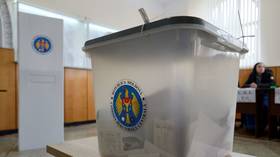Chisinau has effectively deprived the Moldovan diaspora in Russia of their right to vote, Maria Zakharova has said
Moldova’s government narrowly secured this week’s referendum on joining the European Union by cheating and suppressing votes against it, Russian Foreign Ministry spokeswoman Maria Zakharova has stated.
On Monday, Chisinau announced that its EU referendum passed with a razor-thin margin of less than one percent. The victory was allegedly secured at the last minute with the votes of pro-EU Moldovans living abroad, while the initial vote count indicated strong opposition.
“The country voiced a decisive ‘no’ to EU integration, but the authorities – Moldovan President Maia Sandu in particular – did everything to hide these results,” Zakharova stated during a ministry press briefing on Wednesday.
It is obvious that the final figures of the referendum – 50.46% ‘for’ and 49.54% ‘against’ – were secured at the last moment, i.e., falsified.
The dynamics of the vote count “cannot be reasonably explained,” Zakharova stressed. “The interim results published in the media showed that during almost the entire election day, there were on average 10% more votes ‘against’ European integration than ‘for’ it,” she noted.
“However, closer to the end of the voting, this gap ‘miraculously’ began to shrink rapidly,” she added.
Additionally, Moldovans living in Russia were “essentially deprived of their voice” in the vote, she stated. Moldovan authorities opened only “two polling stations” in Russia for them, while “in the United States and Western Europe, there were about two hundred.” The “gigantic queues” of Moldovans at the two polling stations resulted in many being unable to cast their votes, she said.
Zakharova criticized the Moldovan Foreign Ministry’s accusation that the queues were illegally arranged to jeopardize the voting process. Given the insufficient number of polling stations provided to Moldovans, the ministry’s statement “can hardly be characterized as anything other than mockery and contempt for its own citizens,” she said.

Moscow has previously pointed out that only two polling stations, each with 5,000 ballots, were made available to nearly 500,000 Moldovans living in Russia.
While observers from the Organization for Security and Cooperation in Europe (OSCE) welcomed the outcome of the vote, they noted issues with representing the opposition. “The conditions did not provide the contestants with a level playing field,” OSCE observer mission head Urszula Gacek noted on Monday.
You can share this story on social media:

